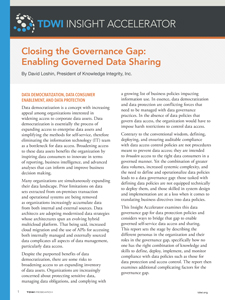
TDWI Insight Accelerator | Closing the Governance Gap: Enabling Governed Data Sharing
July 14, 2021
Data democratization is a concept with increasing appeal. Despite the purported benefits, there are risks to broadening access to an expanding inventory of data assets. Organizations are increasingly concerned about protecting sensitive data, managing data obligations, and complying with a growing list of business policies impacting information use.
In essence, data democratization and data protection are conflicting forces that need to be managed with data governance practices. The combination of greater data volumes, increased systemic complexity, and the need to define and operationalize data policies leads to a data governance gap: those tasked with defining data policies are not equipped technically to deploy them, and those skilled in system design and implementation are at a loss when it comes to translating business directives into data policies.
This Insight Accelerator examines this data governance gap for data protection policies and considers ways to enable governed self-service data access and sharing. We propose that the traditional approach to data protection policies is unsustainable given an expanding enterprise data landscape and suggest ways to bridge this governance gap by taking a fresh look at a semantic approach to data protection roles, data classification, and defining policies.